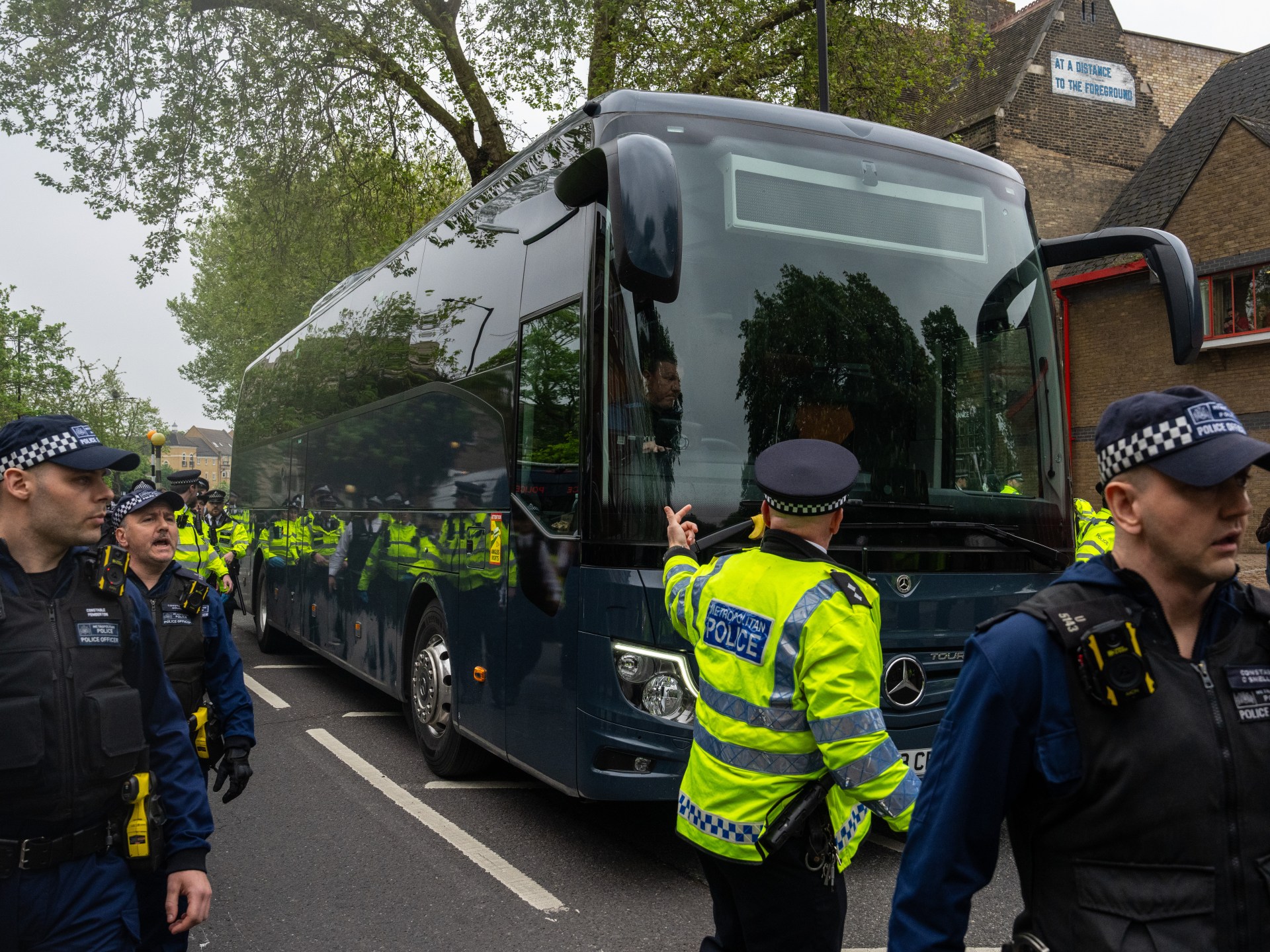Louisiana
Louisiana workers fight back against repressive anti-union legislation
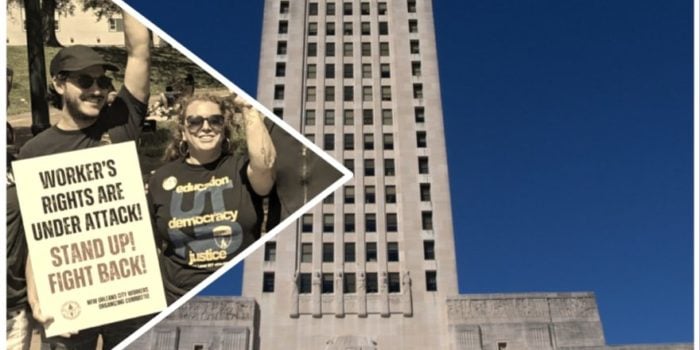
The Republican-controlled Louisiana State Legislature, under the leadership of far-right, white supremacist Gov. Jeff Landry, is ramping up its attack on workers. Several new pieces of anti-union legislation have advanced in the Senate, constituting an all-out war on Louisiana workers. Several unions and community organizations, including the Louisiana branch of the Party for Socialism and Liberation, quickly mobilized in response and took to the streets of New Orleans on April 6 to demand an end to the state’s attack on workers’ rights.
Taken together, the bills introduced amount to a virtual ban on public sector unions. House Bill 572 would prohibit collective bargaining with most public sector unions. Notably, this repressive measure would not impact law enforcement agencies. This is an indication of the power of police unions and their apparent untouchability within the political establishment. Police unions are notorious for protecting killer cops and granting special privileges not afforded to other labor unions. Another bill, House Bill 571, would prohibit government agencies from spending public funds on contract negotiations, and Senate Bill 331 would limit the ways that public sector unions can collect membership dues.
This latest attack on workers comes just weeks after the swift passage of several new racist “tough on crime” bills passed in the Legislature’s Special Session on Crime last month, bound to exacerbate the crisis of over-policing and mass incarceration of Black communities. Now, the legislature is cracking down on even broader swaths of the working class. Among those whose bargaining rights are at stake are the state’s 50,000 public school teachers, whose unions have already been severely undermined by the corporate charter school system built on the wreckage of Hurricane Katrina.
New Orleans city workers, who won an ordinance in the City Council last year that codified their right to organize, fear that their hard-won efforts could soon be reversed. “The legislators are really throwing everything at us all at once to make it harder to fight back against,” said Maria Singer of the New Orleans City Workers Organizing Committee. “Years of work by my colleagues would be destroyed with the passage of many of these bills.”
Grace Reinke, a public sector worker and organizer with United Campus Workers, sees the curtailing of worker’s rights as a targeted measure aiming at repressing worker people, especially in New Orleans. “Conservative elites see growing power in cities like ours and consider it a threat to their interests,” Reinke said. “Anything they can do to make organizing workers harder fits squarely in line with the broader agenda of pushing free-market ideals and maximizing profits at the expense of workers.”
Workers in Louisiana — and all across the Deep South — are among the most exploited in the country. The state consistently ranks among the worst for wages, healthcare access, education, incarceration, and climate impacts. The corporate elite sees the South and its working class as a dumping ground for unwanted externalities. Poor people develop cancer and die when fossil fuel magnates flood their neighborhoods with toxic chemicals; Black working class communities are displaced by wealthy developers seeking new investment opportunities; tens of thousands of migrants are detained in privately-owned immigrant detention centers; the legacy of slavery continues through the violent and racist apparatus of mass incarceration. It would be foolish to divorce the issue of workplace benefits from the myriad of other issues that working class people face.
The ruling class establishment has proven that they will only side with labor when it is convenient for them and not overly detrimental to their primary interests– wealthy bankers, business executives and their shareholders. Despite his election promises to be a “pro-union” president, Biden quickly turned his back on labor in 2022 when he chose billionaire railroad executives over their workers. He signed a bill to block a strike and forced Congress to impose a contract that the union rejected, a clear violation of basic labor rights. A vast majority of Democrats voted in favor of the resolution to avert a walkout.
Former Louisiana governor Bel Edwards won in 2015 and 2019 with the help of a strong base of union support and labor endorsements, including the AFL-CIO. Throughout his tenure he signed some modest reforms into law including paid parental leave for Louisiana state employees and a bill codifying employees’ right to leave for health screening. Yet, after eight years of Democratic governorship, the state still ranks as one of the most abysmal for workers. Louisiana is one of over two dozen “right to work” states, a policy which allows workers to opt out of union membership — a victory for exploitative industries and bosses.
We cannot hang our hopes on either of the corporate, ruling class parties to deliver basic rights to the working class. In the capitalist system, both parties are ultimately accountable to the bosses, and hardly ever to workers. No matter what backwards legislation our politicians pass, our movement will not falter. Only an independent, multinational, working class party, which unites all working class people under a socialist program, is capable of building a mass movement to end the dictatorship of the rich and put working people in power.

Louisiana
Rolling Stones’ Mick Jagger, Governor Jeff Landry trade barbs at Jazz Fest in New Orleans
Rolling Stones’ legendary frontman Mick Jagger took a swipe at Louisiana Gov. Jeff Landry Thursday night during the rock ‘n’ roll group’s set at the New Orleans Jazz & Heritage Festival, and the governor barked back on social media.
After singing the hit “You can’t always get what you want,” Jagger said: “We’re an inclusive group. We like to include everyone. The governor is here, and we’d like to include him, even though he’s trying to take us back to the Stone Age.”
Landry, a conservative Republican, quickly responded with a good-natured quip on his X campaign account, taking a swipe at the 80-year-old singer’s age.
“You can’t always get what you want,” the governor posted on X. “The only person who might remember the Stone Age is @MickJagger. Love you buddy, you’re always welcome in Louisiana! #LoveMyCountryMusic.”
More: Election chaos in Louisiana as only state without a congressional map for fall ballot
Greg Hilburn covers state politics for the USA TODAY Network of Louisiana. Follow him on Twitter @GregHilburn1.
Louisiana
How Louisiana Is Coping With Flooding In Cemeteries


This article is part of The State of Science, a series featuring science stories from public radio stations across the United States. This story, by Eva Tesfaye, was published in collaboration with WWNO.
Emily Dalfrey lives across the street from Niblett’s Bluff Cemetery, where generations of her family are buried, in Vinton, Louisiana.
In 2016, a period of prolonged rainfall caused flooding so severe that people could drive boats over the cemetery. The water put so much pressure on the graves that some of the vaults, which are located near the surface, popped open. Some of Dalfrey’s own family members’ caskets were carried away and deposited in her yard.
Unsure how to restore the cemetery, the community contracted Gulf Coast Forensic Solutions, a company that helps people locate and rebury loved ones after natural disasters damage cemeteries.
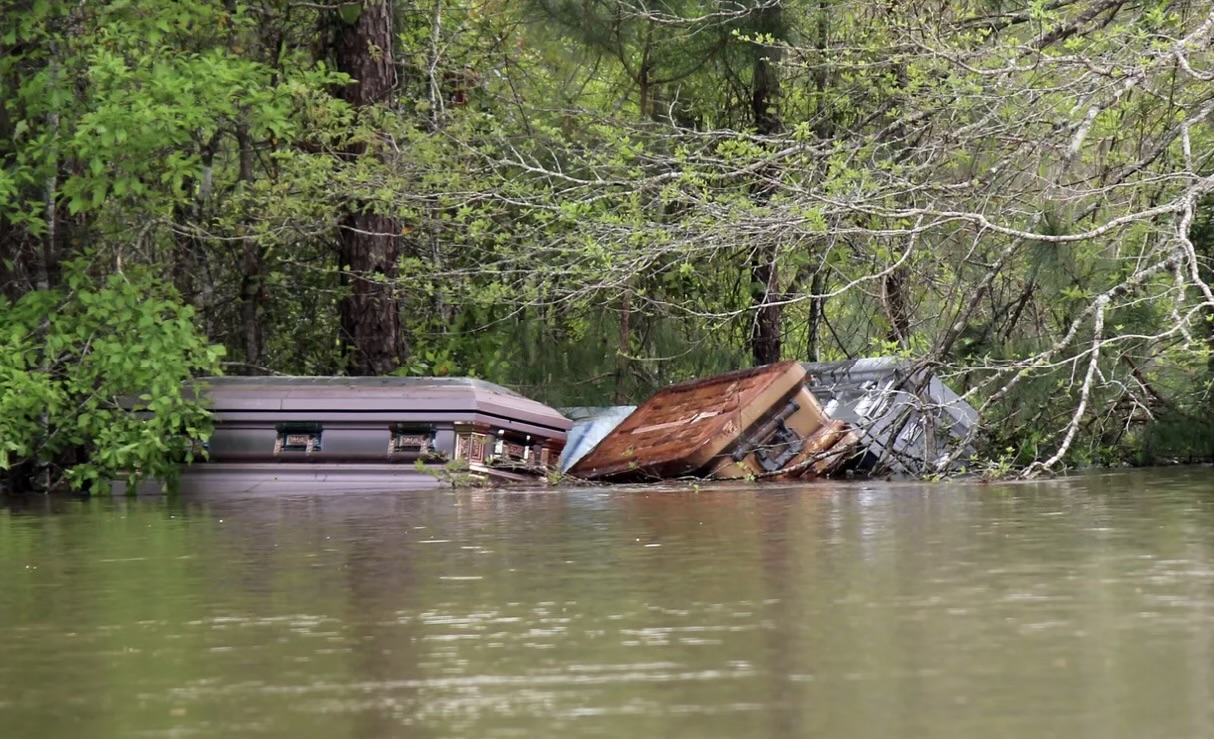
“We truly would have not gotten it done if we would not have had that guidance and that help,” Dalfrey says of Gulf Coast’s assistance. “Because when you bury your family, you think they’re there forever.”
Louisiana has dealt with flooded cemeteries and caskets washing away for decades, but the problem is getting worse—and more widespread. As climate change increases the likelihood of weather-related disasters, many other states are now grappling with damaged cemeteries. And they’re looking to Louisiana for help.
Hurricanes, Flooding, And Mudslides
Charlie Hunter, the CEO of Gulf Coast Forensic Solutions, started in this line of work during his time at the Calcasieu Parish Coroner’s Office, where he worked in death investigation. Normally, such a job involves investigating homicides and car accidents, but Hunter found himself spending a lot of time doing grave site recovery after Hurricane Katrina in 2005.
He started his company in 2020, repairing over 75 cemeteries across Cameron and Calcasieu Parishes in southwest Louisiana after Hurricanes Laura and Delta. He eventually left his job at the coroner’s office and expanded the company in 2023.
“It’s being able to give families a little bit of peace at the end of the day,” he says, “and so I think that’s what’s really important. It’s a never-ending job.”
Working in a state that’s been so frequently pummeled by hurricanes has made him something of an expert in his field.
“Now that cemetery damage and restoration is such a big deal, people reach out to us from all across the country, whether it’s from hurricanes, flooding events, mudslides,” he says.
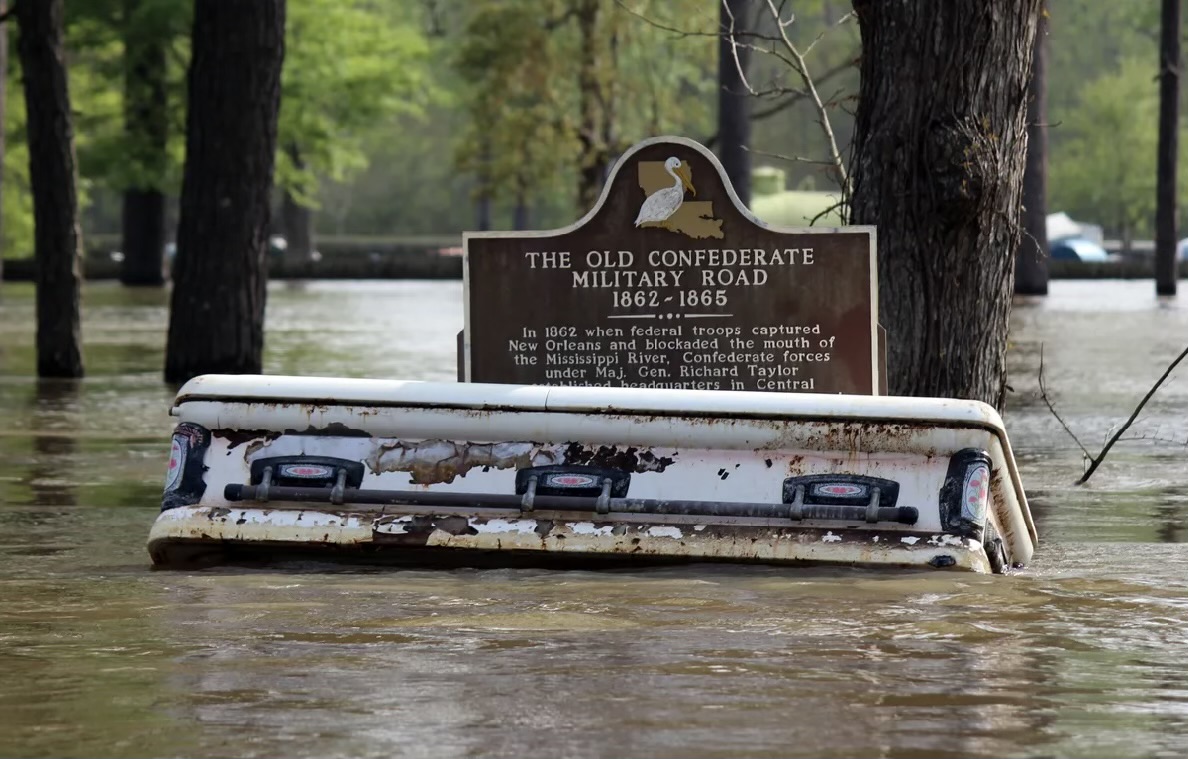
Hunter says he’s helped people in Florida, South Carolina, Tennessee, and even California. One of them was Eva Kenner from Port Charlotte, Florida. She manages Charlotte Harbor Cemetery, the oldest marked cemetery in its county. It was hit by Hurricane Ian in 2022, resulting in 26 fallen trees and close to 100 damaged gravestones.
“I’ve been there 20 years working at the cemetery and we’d never had damaged headstones from a storm before,” Kenner says.
She hired Gulf Coast Forensic Solutions to help repair the cemetery and says the company fixed around 80 headstones in one week—but there’s no getting back those beautiful trees.
“The 26 trees just took away the whole atmosphere. There were great, giant old oaks, hundreds of years old, sun dappled,” she says.
But the repaired headstones have held up, she says, even after other storms have torn through, leaving debris on the ground.
The Louisiana Cemetery Response Task Force
The flooding that damaged Dalfrey’s family members’ graves in 2016 affected more than 800 graves in 74 cemeteries across Louisiana. After that event, the Louisiana Cemetery Response Task Force was created.
“We are the only state that has that,” says Ryan Seidemann, the task force chairman.
The task force is activated when there has been a disaster declaration and reports of cemetery damage. It is currently activated and has been since Hurricane Ida in 2021.
Seidemann says the task force was created to fill a void in federal assistance for cemetery recovery and because in many storm-prone places, there is no one left taking care of cemeteries.
“A lot of folks have moved away over the years. There really weren’t a lot of people to speak for those descendants who had taken off and floated away with the storm surge,” he says.
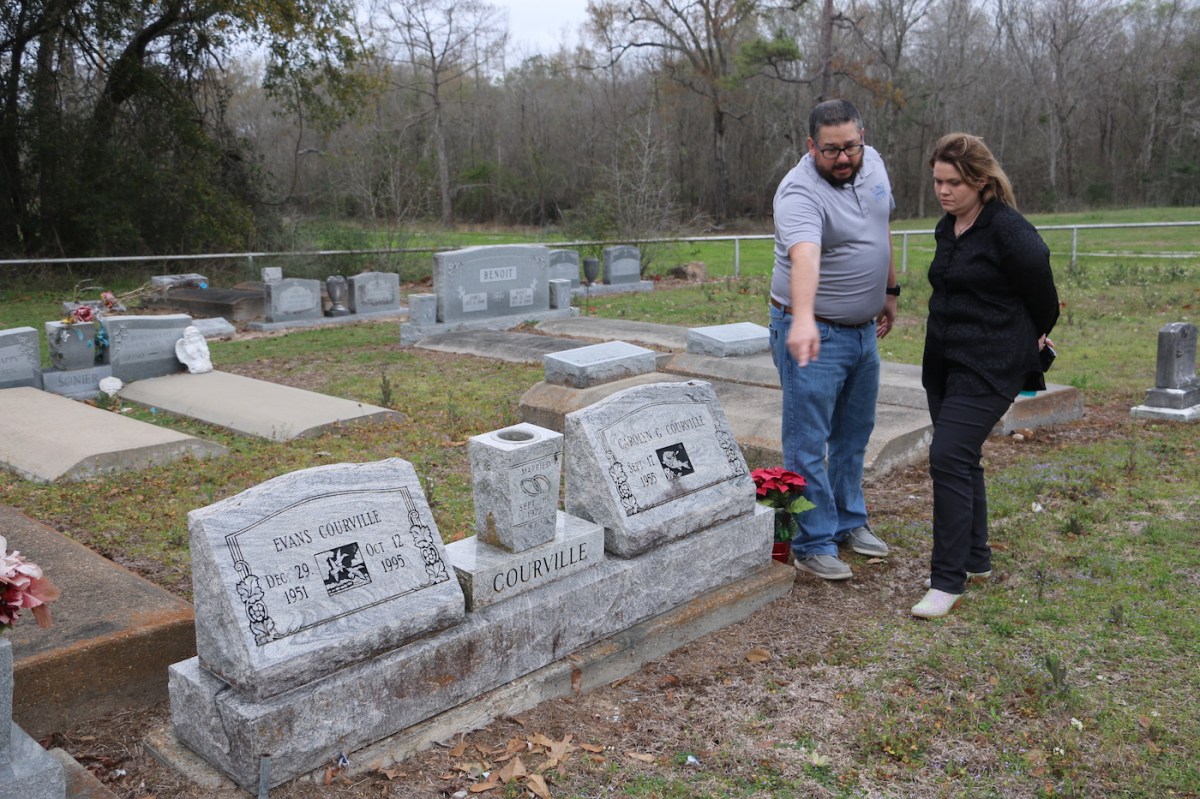
Like Hunter’s company, the task force helps find, recover, and identify lost caskets. Reburial can cost thousands of dollars, but family members of the deceased can receive funding for it through the Federal Emergency Management Agency (FEMA)’s individual assistance program. Because the process of getting that money can be difficult, especially when people are already dealing with fallout from a disaster in other parts of their lives, the task force also helps people apply for it.
And also like Hunter, the task force gets calls from other states where communities find themselves in need of that kind of cemetery restoration expertise—usually along the Atlantic Coast, but sometimes even in the West.
“Oddly, [requests for help have] come from places such as New Mexico, which you wouldn’t think would have flood problems with cemeteries,” says Seidemann, “but apparently as they’ve had wildfire problems and then rainstorms, the undergrowth that is keeping burials in place there is washing off.”
Preparing For Extreme Weather
Climate change is exposing how unprepared cemeteries are for extreme weather events says Jennifer Blanks, a PhD candidate at Texas A&M University who studies cemetery preservation and management.
“Climate change is showing that there actually isn’t really a good protocol or procedure to help with those kinds of issues, in terms of mitigating cemeteries from disasters, and how to recover them afterward,” Blanks says.
That is especially true for Black and other minority cemeteries. In her research, Blanks has found that Black cemeteries in Louisiana have more exposure to flood hazards and proximity to hazardous chemical sites.
“Traditionally, Black residents and non-white people are forced to settle on land that is undesirable for different reasons, whether it cannot produce any type of crop or products, or the value of the land is low because it is in a floodplain,” Blanks says.
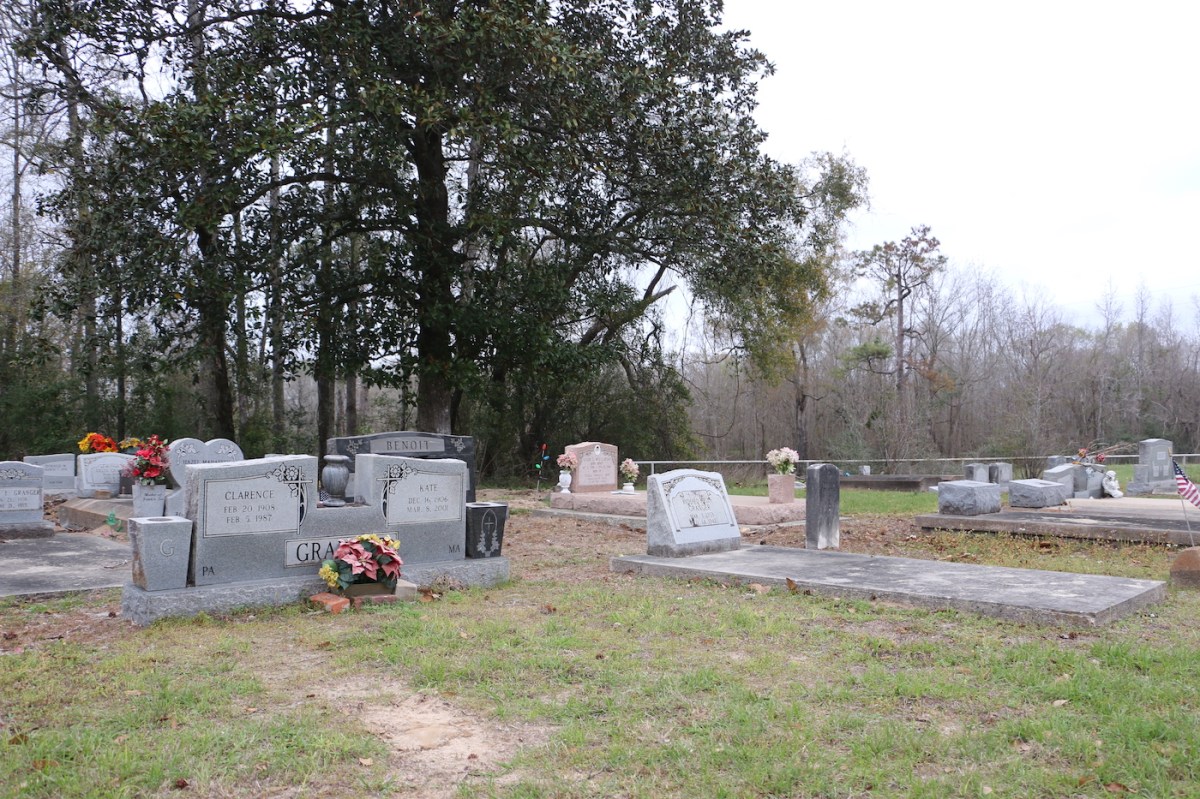
One of the solutions is to bury caskets underground instead of in the surface vaults that are common in Louisiana. Niblett’s Bluff Cemetery now requires that new burials be underground, though there is some debate over whether graves in New Orleans are mostly above ground due to tradition or due to the high water table.
Having good documentation of who is buried where is also extremely important for recovery. If a casket is dislodged and a deceased person cannot be identified, if their next of kin cannot be contacted, or if that person can’t pay, the casket will not get reburied. Hunter says that in those cases his company just tries to get the casket out of public view.
This is exactly what happened in Charlotte Harbor Cemetery in Florida. It could not get FEMA assistance, and Kenner says that finding and contacting relatives of people who had died so long ago would be an impossible task for a cemetery that was established in 1879.
Even in Louisiana—which started to require identification on caskets after Hurricane Katrina—the lack of documentation is still a challenge, Seidemann says.
“Compliance with that has been spotty at best,” he said.
Blanks said those who manage cemeteries should work with the community to gather local knowledge of graves and consider creating maps.
“It’s one thing to protect the physical landscape,” she says, “but it would also be a disservice to not preserve or recover the cultural heritage that is in the landscape itself.”
Further Reading
Louisiana
Louisiana AG sues Biden Admin over new ATF rules on private firearms sales

BATON ROUGE, La. (KALB) – Louisiana Attorney General Liz Murrill announced that she is suing the Biden Administration in a multi-state coalition over what she says is an unlawful ban on private firearm sales.
In the weeks before, the U.S. Department of Justice expanded their rules and regulations, requiring background checks and licenses for any private gun sale.
The Office of the Attorney General claims the restrictions are unconstitutional, intrusive and serve as a direct attack on Louisiana’s right to bear arms.
Murrill released a statement with her lawsuit announcement saying:
“These new rules clearly violate the Second Amendment. The Biden Administration continues to recklessly attack our constitutional rights. Louisiana will challenge them every step of the way.”
Click here to report a typo. Please provide the title of the article in your email.
Copyright 2024 KALB. All rights reserved.
-

 News1 week ago
News1 week agoLarry Webb’s deathbed confession solves 2000 cold case murder of Susan and Natasha Carter, 10, whose remains were found hours after he died
-

 World1 week ago
World1 week agoHaiti Prime Minister Ariel Henry resigns, transitional council takes power
-

 News1 week ago
News1 week agoFirst cargo ship passes through new channel since Baltimore bridge collapse
-

 World1 week ago
World1 week agoUS secretly sent long-range ATACMS weapons to Ukraine
-

 World1 week ago
World1 week agoSpanish PM Pedro Sanchez suspends public duties to 'reflect'
-

 News1 week ago
News1 week agoAmerican Airlines passenger alleges discrimination over use of first-class restroom
-

 Movie Reviews1 week ago
Movie Reviews1 week agoHumane (2024) – Movie Review
-

 Education1 week ago
Education1 week agoVideo: Johnson Condemns Pro-Palestinian Protests at Columbia University













